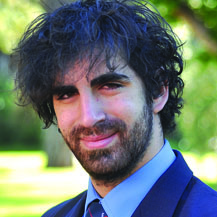 |
| Richard Chemaly |
He is the president of the Student Representative Council, holds leadership positions of various organisations and is a member of Mensa, an organisation for people with a high IQ. With a list of achievements that keeps on growing, Richard Chemaly seems destined for great things.
This Kovsie student has been named one of 17 students countrywide who received the sought after Abe Bailey Travel Bursary for 2012. He was chosen from hundreds of UFS applicants and will depart for Britain in November, to visit several universities in England and Scotland. He will travel with the other bursary holders.
Richard, a postgraduate LL.B. student, says it is a great honour to follow in the footsteps of previous Abe Bailey bursary holders such as Philip Tobias, Max Price, Tony Frost and Eusebius McKaiser. “It certainly is a stepping stone and one I intend to make the most of.”
He hopes that the experience will broaden his knowledge. “I'll be grateful for whatever I learn as learning is what makes up my human experience.”
Richard says he has not planned much yet for his visit to Britain. “I do, however, intend to go to a quaint book shop in London called Collinge & Clark, which is on my bucket list. It's the store where Dylan Moran - a big influence in my life - filmed his series, Black Books.”